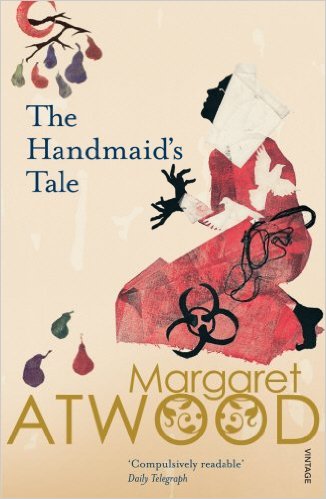
An astounding piece of work.
Because this book is a modern classic, it has been much reviewed, discussed and dissected, which probably renders my review somewhat redundant. That won’t prevent me writing in praise of the novel, however.
The author describes the work as speculative fiction rather than science fiction, and I understand her distinction. There’s little science, other than of the social sort, in the book. It is, however, a book describing a dystopian future and therefore can be included in the same category as 1984, Brave New World, and Animal Farm.
I came late to this work and, in one sense, I’m pleased that’s the case. The author covers themes and topics close to my own heart, and my earlier writing might otherwise have been influenced in ways that could have altered my output; we are all, whether we wish it or no, subject to the suggestion inherent in a work of great art.
Here, the writer has taken as her starting point the right wing conservative religious extremism of the USA at a time when it felt threatened by burgeoning freedoms, especially for women. She has developed the social mores and thoughtless dogma of that society’s pious vengeance to a logical extreme. The USA was initially invaded and overrun by groups of disciples of various sects who wished not to escape persecution but to impose their brands of religion on others. A land sparsely populated was seen as an ideal opportunity by those founding fathers.
This book carries that spirit of evangelism to its logical and horrific conclusion; a state where politics and dogma permit continued luxury and comparative freedom for the elite at the expense and exploitation of all others.
It describes the hypocrisy of religion so well, underlining the obsessive fear of sex and resultant restrictive rules, whilst exposing the indifference to real goodness and true morality. Presented in informal diary style through the eyes and memories of a young woman caught in a vile artificial trap of the hierarchy’s making, this tale explores and uncovers the real moral dilemma of the gentle rebel caught in a totalitarian society.
The author’s insight into the workings of minds as varied as the innocent unbeliever and as corrupt as the dogmatic despot is deep and enlightening. That she manages, at the same time, to express the similarities of such diverse minds is an indication of her extraordinary understanding of the human condition. She conveys the emptiness, pointlessness and inevitable downfall of a totalitarian regime in subtle and empathetic language that burns into the consciousness and produces a bleak and barren picture.
Love is here, and its partner, hope. But these are so buried in the iniquities of the ambition and self-preservation of those in authority as to appear no more than dim sparks. Yet their very presence is enough to ensure the pages are turned.
The language, metaphor and poetry of this writing are exceptional and, in a story with so little actual action, it’s the emotional layering that carries the reader through to the utterly inevitable ending. Brilliant!
#
Those who’ve read my fantasy trilogy, A Seared Sky and/or Blood Red Dust, will understand my comments here much more deeply.



Such an astounding book. One of my top 3 reads from from the college years.
LikeLiked by 1 person
True, Jean. A brillaint piece of imagination translated into accessible story. What more can we ask of a writer?
LikeLiked by 1 person
Apart from juggling flaming bowling pins while singing the theme song My Little Pony, I can’t think of anything…. 🙂
LikeLiked by 1 person
Oh, no! I’ve burnt my fingers, dropped the pins and frightened the neighbours with my singing! And nobody was even watching.
LikeLiked by 1 person
Blast it! And me without my camera! 🙂
LikeLiked by 1 person
Time! Not the elastic commodity some would have us believe. Limited, precious, and unrecyclable. So priorities become vital. I wonder how much really good stuff we miss simply because we’re drowning in the mediocre ar, worse, the banal and poor. Still, we can only use our time to the best for us and hope it delivers some joy and interest, eh?
LikeLike
Similarly to you, Stuart, I only came to this book a year or two ago. I read very little Sci-fi or Dystopian fiction, so I never felt the urge to read this. That I was persuaded to do so, is my own good fortune. And that I enjoyed it so much, is a tribute to Margaret Atwood’s superb. A superb book.
LikeLiked by 1 person
A classic worthy of the name, I think, Mick.
Sci-fi has a slightly distorted reputation due to the early tendency of USA publishers to produce a great deal of pulp fiction supposedly as science fiction. But when you understand it contains such gems as 1984, Brave New World, The Time Machine, The Invisible Man, and The Handmaid’s Tale, it takes on a wider scope and hopefully tempts in more readers willing to experiment.
I read a great deal of sci-fi in my teens and early twenties, and discovered some real gems penned by Ray Bradbury, Brian Aldiss, Isaac Azimov and many others. Fortunately, it’s not all Whizz-Bang Superheroes Vanquishing Sexy Women in Aerial Battles in Outer Space! Some of it is really quite intelligent and thoughtful. Definitely worth exploring, I think.
LikeLiked by 1 person
I’ve read those 5, and quite agree with you, Stuart. And there’s loads of pulp around in many other genres, of course. And yes, as a teenager especially, I read lots of Azimov, Bradbury and Aldiss, retaining a good deal of respect for all of them. I guess it’s just that there are other genres I prefer to read, plus a great deal of non-fiction, too. And there is only so much time!
LikeLiked by 1 person
Glad you liked the book. I’ve never read it, but it sounds good.
LikeLiked by 1 person
Definitely worth adding to that ever-growing ‘to read’ list, Rachel!
LikeLiked by 1 person